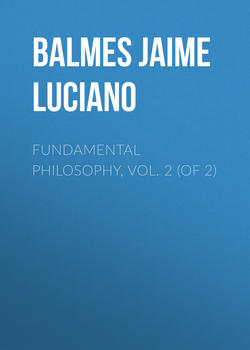Читать книгу Fundamental Philosophy, Vol. 2 (of 2) - Balmes Jaime Luciano - Страница 27
BOOK FOURTH.
ON IDEAS
CHAPTER XXVII.
INDIVIDUAL AND INTELLECTUAL PHENOMENA EXPLAINED BY THE UNIVERSAL SUBSISTING REASON
Оглавление172. Starting from the phenomena observable in individual reason, we have arrived at universal reason. Let us, so to speak, make the counterproof; taking this universal subsisting reason, let us see if individual reason in itself and in its phenomena can be explained by it.
I. What are necessary truths? They are the relations of beings, such as they are represented in the being which contains the plenitude of being. These necessary truths, then, stand in need of no individual finite reason; their reason is found in an infinite being.
II. The essence of all beings, abstracted from all particular beings, is something real, not in itself, and separately, but in the being which contains the plenitude of every thing.
III. On this supposition science is not full of empty words, nor of mere creations of our reason, but of necessary relations represented in a necessary being, and known by it from all eternity.
IV. Science is possible; there is some necessity in contingent objects; their destruction does not destroy the eternal types of all being, the only object of science.
V. All individual reason, sprung from the same source, participates in one same light, lives one same life, has one and the same patrimony, is indivisible in the creative principle, but divisible in creatures. The unity, then, or rather the uniformity or community of human reason is possible, is necessary.
VI. The reason, then, of all men is united by the infinite intelligence: God then is in us; and the most profound philosophical truth is contained in these words of the Apostle: "In ipso vivimus, movemur, et sumus."
VII. All philosophy, therefore, which seeks to explain reason, by isolating it, considers only particular phenomena unconnected by a general bond, pretends to construct the magnificent fabric of our reason upon particular facts alone, but does not appeal to a common origin, to one source of light whence all lights have sprung, is a false philosophy, is superficial, at war with theory, and in contradiction with facts. When we reflect upon this, we can but pity Locke, and still more Condillac, and their explanations of human reason by sensations alone.
VIII. Thus we understand why we cannot give the reason of many things; we see them; they are thus: they are necessary; more we cannot say. A triangle is not a circle: what reason can we assign for this? None! It is so; this is all. But why? Because there does actually exist an immediate necessity in the relation represented in the infinite being, which is truth by essence. The same infinite intelligence sees no greater reason of itself, than in itself. It finds every thing, and the relations of all things in the plenitude of its being; but beyond them is nothing. He gave to individual reason, when creating it, an intuition of these relations: no discursion proves them; we see them; this is all.
IX. Some even who admit the subjective value of ideas, either doubting or denying their objectivity, lose sight of this fact. They seek an argument, where there is need only of a vision; they demand degrees where there are none. When human reason sees certain truths, it cannot go farther and doubt of them. It is subject to a primitive law of its nature, which it cannot abstract without ceasing to be what it is. By the very act of seeing the object it is sure of it; the difference between subjectivity and objectivity falls within the space of inferences, but not within that of immediate reason, or the understanding of necessary truths.
173. We leave it to the reader's judgment whether the preceding explanation is more satisfactory than that by impersonal reason; the theory we have attempted to expound has been held by all the most eminent metaphysicians. With God, all is clear; without God, all is a chaos. This is true in the order of facts, and not less so in the order of ideas. Our perception is also a fact; our ideas likewise are facts; over all presides an admirable order; a chain which cannot be destroyed unites all; but neither this order nor this chain depends upon this. The word reason has a profound meaning, for it refers to the infinite intelligence. What is true for the reason of one man cannot be false for the reason of another; there are, independently of all communication among human minds, and of all intuition, truths necessary for all. We must, if we would explain this unity, rise above ourselves, must elevate ourselves to that great unity in which every thing originates, and to which every thing tends.
174. This point of view is high, but it is the only one; if we depart from it we can see nothing, but are forced to use unmeaning words. Sublime and consoling thought! Although man disputes upon God, and perhaps denies him, he has God in his understanding, in his ideas, in all that he is, in all that he thinks; the power of perception communicates God to him; objective truth is founded on God; he cannot affirm a single truth without affirming a thing represented in God. This intimate communication of the finite with the infinite, is one of the most certain truths of metaphysics. Although ideological investigations should produce no other result than the discovery of so important a truth, we ought to consider the time spent in them well improved.
